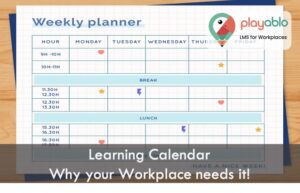
What are the three critical elements of an infectious learning culture? Boost your employees’ ownership of learning, perfect your compliance training game, and promote personal development? And how do you achieve all of them in one go? By developing a full-fledged, comprehensive learning calendar. When you own and properly maintain a training calendar, you can reap multiple benefits. Let us see what the various upsides of having one in your organisation are:
The Upsides of a Learning Calendar
You can use a learning calendar to:
- Keep track of the upskilling process of your employees
- Make a proper schedule of when and how to onboard + train recruits
- Maintain a consistent compliance training schedule
- Share information about training requirements with your peers
- Create a culture of learning
How to Make a Create a Learning Calendar?
The design of a learning calendar depends on what type of training culture you want to create in your company. For instance, if your development strategy is collaborative, your workforce will have to be responsible for their learning needs and requesting training opportunities. Again, if your culture is individualised, the HR team or group supervisor will manage the training system. The calendar will concentrate on compliance training or a strategy to close skills gaps in such a case.
An interactive training calendar is a perfect option when every staff member has access to opportunities. Here, employees are encouraged to take on available training to develop as much as possible. We also have personal or team training calendars, which are designed especially for people responsible for managing the personal and professional development of the workforce. Yes, there are multiple methods of making a learning calendar. But the best design is the one that motivates employees to take ownership of their development process.
A Detailed Analysis of Why Your Organisation Needs a Learning Calendar
Manage Compliance Training
Compliance training is vital since adhering to specific rules and regulations is legally inevitable for almost all corporate learning Platforms. Hence, it would be best if you made it a point to dedicate set hours to decide who needs to do what and when. Giving employees specific time to do their training also means that compliance training becomes an integrated part of the job. Several companies find it challenging to deliver compliance training because employees find the sessions monotonous or do not understand the importance. You can solve this issue by setting aside specific time to do training. By doing so, your staff members will not be inclined to worry and rush through the program. Why? They will know that they won’t be losing out on productivity. And when productivity is not hampered, the experience becomes more efficient.
Share Upcoming Training Opportunities
an organisation, you might come up with several opportunities. These can be in the form of skills workshops, conferences, presentation skills lectures. And you never know who might want to get involved. A training calendar will enable you to schedule potential training days. Once you share the information, you can find out who’s interested. And the results might surprise you! Sharing opportunities for training through email or a noticeboard can also provide bonding time for staff, boost morale, and uncover hidden talent within your existing workforce. So give it a try!
Promote a Learning Culture

A culture of continuous learning leads to the creation of a healthier, happier workplace. Why? Your workforce is motivated to learn more and to bring more. To embed a learning culture in your company, one of the primary requirements is to create a collection of learning-centred organisational values, practices, and conventions. One of the best ways forward here is to develop a learning contract. A learning contract enables you to gauge the training needs and wants in your organisation.
One of the quickest ways to develop a learning contract, and thus a professional learning culture, is to invite an employee to give responses to the following four questions:
- How do you expect continuous professional learning to generate an impact in your organisation?
- Which are the most cost-effective techniques for corporate training platform?
- What knowledge and skills are required to reach your end goals?
- What are the obstacles in professional learning, and how can they be addressed?
Once you get your answers, summarise them in a single working document. The learning contract is a shared, working document that you can update when you gain more experience. It may be termed as a contract, but it serves more as a memorandum of understanding.
Provide employees with a fixed time slot each week to read and research at work. Formalising time for employee development encourages employees to use the time and will cement your learning culture. You can even ask employees to share what they have learned or the articles they have read with their team to foster mutual development.
Close Skill Gaps
Not everyone in a team is equally efficient. Some of your employees may lack essential soft skills, such as good communication or emotional intelligence. Others might not have the required hard skills. In both these cases, you can use a learning calendar to manage skills within your existing workforce. You can then plan opportunities to close skills gaps. To give you a clear idea, the World Economic Forum lays down the essential skills demanded by organisations:
- Complex problem solving
- Critical thinking
- Creativity
- People management
- Coordinating with others
- Emotional intelligence
- Judgement and decision-making
- Service orientation
- Negotiation
- Cognitive Flexibility
Bottom Line
You can also use a training calendar as evidence. For instance, suppose someone is leaving the company. In this case, a training calendar can demonstrate that opportunities were made available to fix the problem, behaviour or skill deficit through informal means and training. Do you wish to learn more about designing the perfect learning calendar as per your specific organisational requirements? Then, you can instantly contact our experts at PlayAblo!

